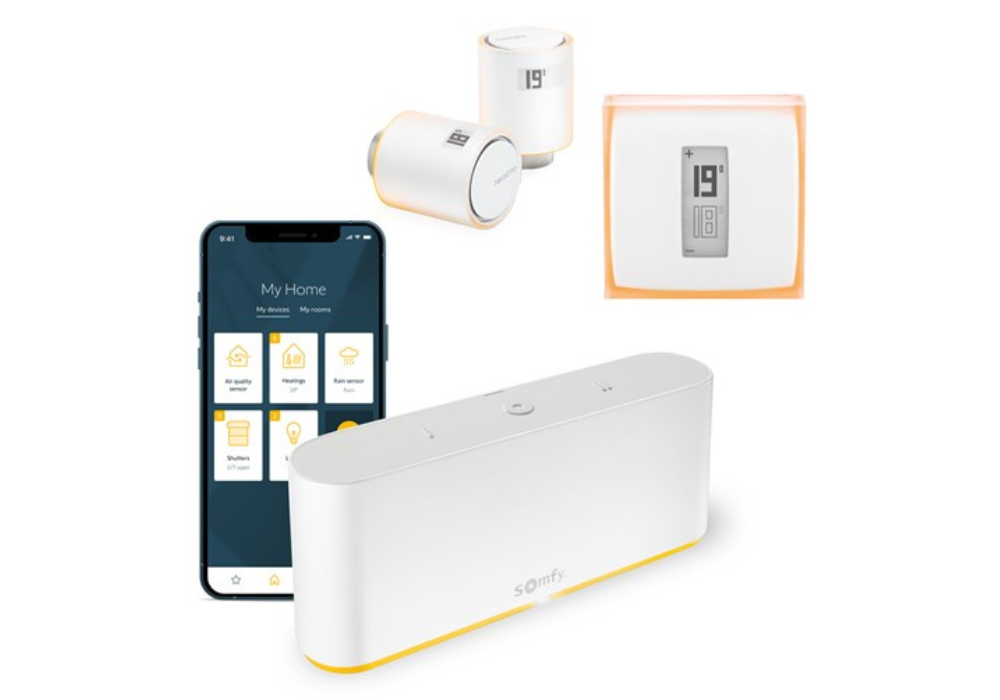
Inteligentny Termostat i Głowice Termostatyczne marki Netatmo kompatybilne z centralą TaHoma switch od Somfy

At Netatmo, we’re mainly interested in infrared sensors for the purposes of top quality home security. But, infrared technology has so many wider applications that they certainly deserve a mention, too.
If you’re just looking for more information on how infrared sensors can add value to your home security set-up, head on down to the later sections in this piece. But, if you’re interested in the wider uses of infrared sensors, you’re right on track here.
Infrared sensors are used in a whole range of industries and scenarios. For example, you could use infrared sensors in your home to turn on automatic lighting fixtures or water taps. Your home heating lamps and toaster will use infrared radiation to transmit heat, while your TV remote control uses infrared radiation to send electronic signals to the TV set itself.
In terms of wider applications, infrared sensors have specific uses in the nocturnal study of animals. Infrared sensors are vital to studying the natural habits of nocturnal wild creatures, without disturbing them or alerting them to human presence by bringing sources of light into the mix.
Similarly, infrared sensors are vital components of thermal imaging cameras and night vision goggles.
Infrared sensors essentially have the ability to detect the heat radiation (also known as infrared radiation) that emanates from living things and hot objects. So, anything moving around your property, whether animal or human, will create a neat infrared body heat outline for your security sensors to pick up on.
So, infrared sensors respond to sources of heat, rather than sources of light. That means that integrating infrared sensors into your home security system guarantees it can detect the goings-on in and around your home around the clock, even during the night.
Once your infrared sensors detect a presence on your property, they can use this information to trigger your wider home security system. This might be automatic security lighting designed to deter intruders, or a loud security alarm.
Because infrared sensors respond to temperature, rather than light, a home security product that includes these sensors is able to guarantee accurate motion detection functions at all times of day and night.
However pitch black the night may be, your home’s infrared sensors will still be able to function to the best of their ability. While our optical faculties would be severely impaired by the lack of light, infrared sensors have no issue picking up on temperature profiles as normal.
Install a series of security devices that incorporate infrared sensors around your home and you’ll be well on your way to ensuring 24-hour security.
The Netatmo range of Smart Indoor
and Outdoor Cameras incorporates high function infrared sensors. What’s more, these infrared sensors can accurately tell the difference between normal movements around your home and suspicious motion that could indicate that there’s an intruder on your property. So, you won’t have your security alarm triggered every time your pet wanders on to your property – just when there’s a human profile detected.
If you choose to go for smart, wireless home security cameras that include infrared sensors, these will give you the option of viewing your home security footage remotely, wherever you are. If your motion detection and facial recognition features combine to generate a security alert, you’ll be able to remotely trigger your home’s alarm, deterring an intruder even when you’re not in the building. Thanks to the Netatmo's Smart Alarm System with Camera enjoy the peace of mind that comes with a complete video alarm system
Home security technology continues to develop around us, helping to keep our homes, our families and our possessions safe from harm. Infrared sensors are no different: home security companies are continually developing innovative ways to enhance this technology and to incorporate it into additional security functions.
Night vision, motion detection, facial recognition, interconnected security alarms, security lighting… it’s all possible!
To better explain how all these added features could combine to give your home security set-up an added edge, let’s talk them through with a hypothetical scenario.
Let’s say that your Smart Outdoor Camera detects some motion on your property, via a temperature profile that comes within range of its incorporated infrared sensors.
It’s already night time, but that doesn’t stop the infrared sensors: with added facial recognition technology, they can still accurately assess whether the presence is an intruder, or a known person.
So, facial recognition features tell us that the person is recognised. No security alarm is triggered, but motion detection features turn on the automatic security lighting, showing them the way to the front door safely.
Facial recognition failed? If your infrared sensors are incorporated into smart security devices such as cameras, these will alert you to the potential intruder via an alert on your linked devices.
Motion detection features will then turn on the automatic security lighting to attempt to deter the intruder, by removing the cover of darkness.
Plus, if you’ve chosen to configure a security alarm function, the combination of the infrared sensors picking up the temperature profile, the failed facial recognition and the triggered motion detection will set off your home security alarm.
This will add a further deterrent for the intruder, as well as alerting you and others to the fact that there’s a possible security incident at your home.
While the addition of these extra security features will increase the price of your home security devices, you may decide that the heightened security and ease that comes from them all working together is worth the added investment.

Włamanie
Wireless motion sensors: how can you integrate these security products into your home?

Włamanie
Presence sensors: why are these products useful?

Włamanie
Presence detectors: which product model is best for your security set-up?

Włamanie
Motion sensors: what use are these devices as part of your home security?